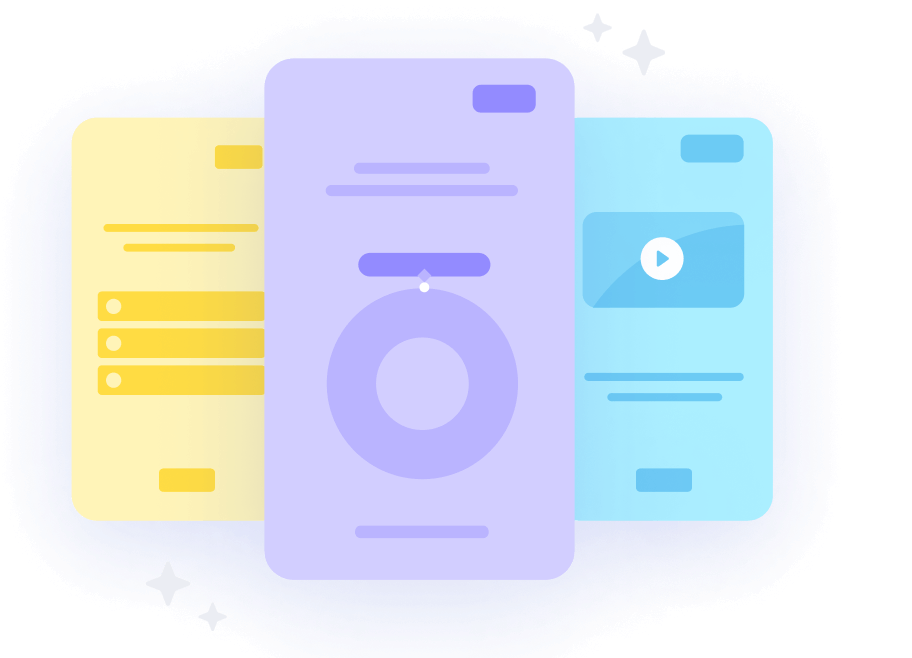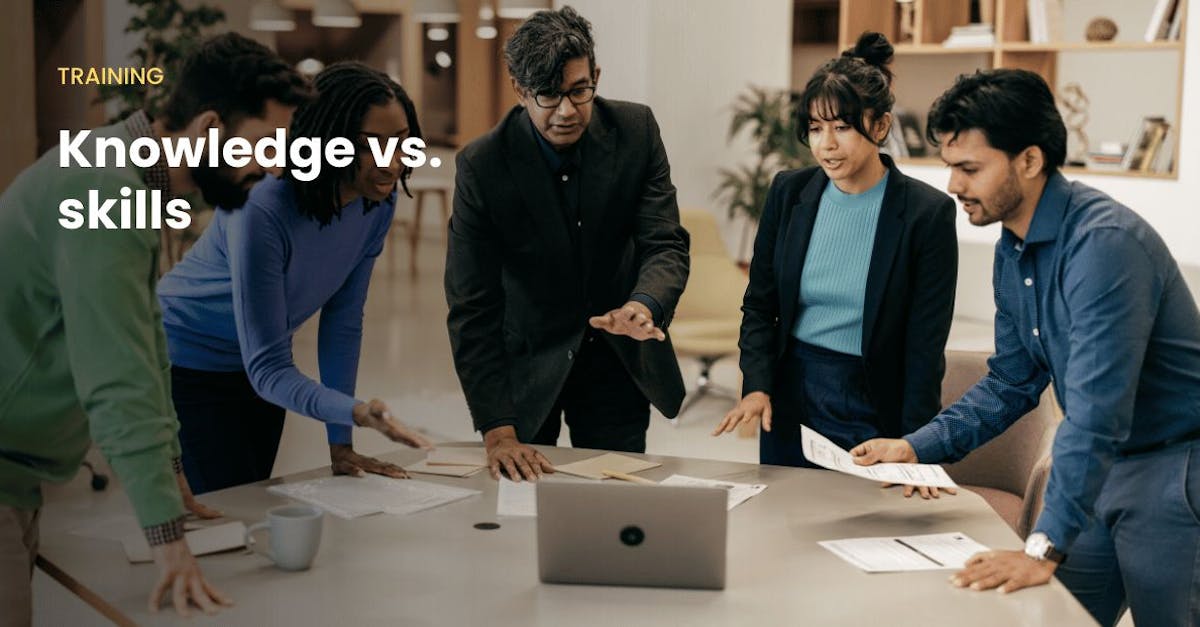Knowledge vs skills: How to develop both in the workplace
Published
July 24, 2024
Author
Share
A healthy work environment is the recipe for employee satisfaction and retention. Giving your team the space to develop new skills inspires them to perform better at work.
The debate around knowledge vs. skills has been ongoing, with employers feeling the need to sacrifice one for the other. In reality, both are closely related and essential for your business to succeed.
This article offers a comprehensive guide to developing both knowledge and skills in the workplace. Discover strategies for improving your management and more.
The difference between knowledge and skills
For your team to thrive and meet collective expectations, they must cultivate knowledge and skills in the workplace. As these two go hand-in-hand, what does the discussion surrounding knowledge vs. skills really mean? Let’s begin by defining each and listing their different types.
What is knowledge?
Knowledge is a combination of accumulated information, facts, and theories. It’s a conscious awareness of the things around you, without the need to second guess. Knowledge can be transferred from one individual to another or gained through personal experience and observation.
Types of knowledge
To develop a holistic workforce, engage your team in knowledge sharing, as this leads to better growth and performance. Note that there are different types of knowledge, so to help you decide which is best for your team, we’ve narrowed down their concepts below.
1. Explicit knowledge
Commonly used during onboarding sessions, explicit knowledge is easy to digest, store, document, and pass on to others. It comes in tangible formats like training manuals, video tutorials, user guides, and handbooks.
With the rise of digital tools, onboarding, upskilling, and refresher training have become simple to carry out nowadays. Mobile-first platforms like SC Training (formerly EdApp) help enhance your team’s learning journey with a wide selection of course management features. Feel free to customize their due dates or set recurring courses, so your team stays focused on what’s important.
2. Implicit knowledge
Unlike explicit knowledge, which can be quickly transmitted, tacit knowledge can only be gained through first-hand experience.
For example, you’re training a new sales associate on the team. While you’ve given them tips to handle aggressive customers calmly, they can only develop implicit knowledge once they’ve encountered such people directly.
3. Tacit knowledge
While similarly gained through experience, tacit knowledge is unique in that it relies on intuition. So it can’t easily be transferred or documented, unlike the two types mentioned above.
Imagine performing a sales pitch to a potential customer. Even before voicing your ideas, you already know which lines to avoid. Here, tacit knowledge is at work because it’s the basis for knowing which ones would strengthen and harm your sales pitch.
4. Procedural knowledge
This relies on long-term memory to perform particular tasks. Implicit in nature, you accumulate this knowledge by experiencing things first-hand. Procedural knowledge is the memory of knowing how to do something.
5. Declarative knowledge
Also known as propositional knowledge, the fifth type refers to static information. It's based on facts, concepts, events, or principles.
For example, you’re onboarding new hires on the team. It’s normal to expect they’re already aware of the job’s responsibilities, having already been disclosed during the hiring process. This is what declarative knowledge is about.
6. A Priori knowledge
This type goes hand-in-hand with A posteriori knowledge. A priori is a Latin term meaning ‘from the former.’ This knowledge is naturally formed, apart from experience or evidence. Simply put, it is the sole product of abstract or logical reasoning.
Still, to hone one’s a priori knowledge, an employee must gain experience in the specific field.
7. A Posteriori knowledge
Lastly, a posteriori knowledge is based on empirical truths. A Latin term for ‘from the latter’, this type relies on a priori knowledge and can be logically explained only after a person has observed a certain event.
What are skills?
Skills refer to the ability to apply existing knowledge to accomplish a certain task. Knowing which skills to use when approaching a problem demonstrates a person’s familiarity with the issue. When put into practice, knowledge turns into skills.
Types of skills
There are two types of skills that employees must develop to accomplish their tasks successfully. Aside from differentiating hard skills vs. soft skills, we’ll discuss how you can cultivate both to promote proactiveness among your team members.
1. Hard skills
These are derived from hands-on experience or education. Examples of useful hard skills include accounting, project management, report writing, and digital literacy.
2. Soft skills
On the other hand, soft skills are honed through forming connections with other people. Empathy, adaptability, collaboration, and critical thinking are important skills that employees need to advance their careers.
How to develop knowledge and skills in the workplace
The difference between knowledge and skills is that the former is theoretical, while the latter is practical. To help your team develop both, start by sharing knowledge first and then give them opportunities to practice their skills.
As this change doesn’t happen overnight, everyone must remain dedicated and consistent to improving themselves daily. Allow knowledge to naturally transform into skills with these best practices:
1. Create a training needs assessment
It’s hard to solve a problem without first conducting a diagnosis. Like a doctor giving out prescriptions, you should start with a training needs assessment (TNA). This helps identify performance gaps among your employees so you can determine the best course of action to support their career development.
Use artificial intelligence (AI) to speed up your assessment process. SC Training offers robust reporting and analytics to spot knowledge gaps among your team immediately. Access all learning data at a glance and export key metrics with just a click.
2. Use online resources
We’re now in an age where in-person training and paper documents are no longer the norm. Jumpstart and streamline your training by taking advantage of the newest tools on the market. To make your processes hassle-free, find a tool that offers an all-in-one solution for onboarding, refreshing, and training your team.
3. Attend in-person forums or webinars
Another way to enhance your team’s knowledge and skills is by keeping up with the latest industry trends and best practices. Encouraging your team to attend conferences or webinars is a win-win situation for both parties.
As the manager, you’ll gain insights into implementation strategies and how to cater to different learning styles. Meanwhile, the testimonies will inspire your members to advance their careers.
4. Boost digital literacy
Don’t let your team’s lack of experience with digital tools get in the way of accessing extensive information and connecting with a global audience. Conduct workshop sessions to refresh your team on the software they use daily. Find ways to optimize their workflows.
5. Embrace networking
Give your employees a chance to grow their professional network. This will develop their knowledge and skills and grant them a competitive edge in the field. As a manager, this also creates a positive image for you, reflecting your care and sincerity for the team.
You can start by training them during your scheduled catch-ups and offering practical advice on how to engage with professionals on a deeper level. The key is for them to maintain strong and lasting relationships.
Transform knowledge into skills today with SC Training
Now that we’ve explored their key differences, we can put the knowledge vs. skills debate to rest. For your team to thrive, they need knowledge as the foundation and an outlet to sharpen their skills.
As their manager, remember that developing knowledge and skills is an ongoing process that requires patience, commitment, and enthusiasm. So don’t do the heavy lifting yourself! You have the power of technology on your side. Find a tool that offers a seamless way to track and manage your team’s performance.
Luckily, we’ve got just the right one for you. SC Training’s mobile-first platform is a simple but cost-effective solution for onboarding and upskilling teams on the go.
The magic lies in its comprehensive admin and learner experience. You get access to a centralized dashboard for tracking individual or team progress and exporting performance metrics instantly. This lets you spot knowledge gaps quickly and devise better learning outcomes.
Unlock your team’s full potential through the platform’s game-based training, where they can tap, swipe, and drag their way through essential workplace learning. To reward top performers, you can give out custom certificates to motivate the team while keeping the design on brand.
Develop your team’s knowledge and skills with the best training platform. Sign up for SC Training today.
Author
Bea Maureen Cayone
Bea Maureen Cayone is a content specialist at SC Training, a leading mobile-first operations platform that provides advanced solutions for frontline training. With expertise in workforce management and workplace safety, she creates content tailored to the logistics, transportation, and energy industries. Outside of work, she enjoys reading, playing the piano, and walking her dogs.

